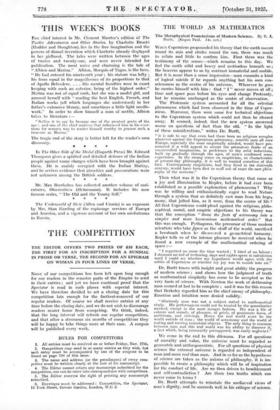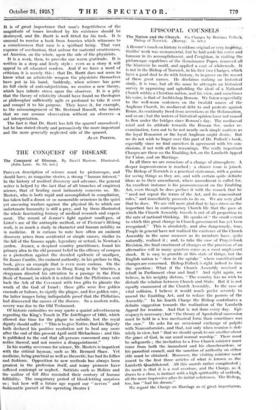THE WORLD AS MATHEMATICS
The Metaphysical Foundations of Modern Science. By E. A.
Burtt. (Kegan Paul. 14s. net.) -
WIIEN Copernicus propounded his theory that the earth moves. round its axis and circles round the sun, there was much to refute and little to confirm him. First there was the testimony of the senses—which remains to this day. We feel the earth solid and heavy and motionless beneath us ; the heavens appear to us by contrast immaterial and mobile. But it is more than a sense impress. ion—man commits a kind of logical suicide if he regards anything but his own con- sciousness as the centre of his universe. Wherever he goes he carries himself with him : that " I " never moves at all ; time and . space pass before his .eyes and change Proteanly, but he remains unchanged as the centre of observation.
The Ptolemaic system accounted for all the celestial phenomena which had been observed in the time of Coper- nicus. Moreover; there were some feir technical objections to the Copernican system which could not then be cleared away. It seemed, indeed, that the new system answered worse on questions of fact than the old. " In the light of these considerations," writes Dr. Watt, " it is safe to say that even had there been no religious scruples whatever against the Copernican astronomy, sensible men all over Europe, especially the most empirically minded, would have pro- nounced it a wild appeal to accept the premature fruits of an uncontrolled imagination, in preference to the solid inductions, built up gradUally through the ages, of men's confirmed sense experience. In the strong stress on empiricism, so characteristic of present-day philosophy, it is well to remind ourselves of this fact. Contemporary empiricists, had they lived in the sixteenth century, would have been first to scoff out of court the new phi!o- sophy of the universe."
Then what was it in the Copernican theory that came as a joy and illumination to Kepler, before it had ever been established as a possible explanation of phenomena ? Why was he willing and enthusiastically eager to read Nature through a system that so definitely cast man from his hege. mony, that jolted him, as it were, from the centre of life ? All that Copernicans could plead against the religious, philo- sophical, moral, and empiric objections to his theory was that the conception " threw the facts of astronomy into a simpler and more harmonious mathematical order." But this was enough. Pythagoras, the precursor of those modern scientists who take figure as the stuff of the world, sacrificed a hecatomb when he discovered a geametrical harmony. Kepler tells us of the intense pleasure he received when he found a new example of the mathematical ordering of space :-
" I regretted no more the time wasted ; I tired of no labour ; I shunned no toil of reckoning, days and nights spent in calculation until I could see whether my hypothesis would agree with the orbits of Copernicus or whether my joy was to vanish into air."
Dr. Burtt traces with insight and great ability the progress of modern science ; and shows how the judgment of truth as mathematical simplicity has come to be accepted as the very basis of science. With Newton the work of dethroning man seemed at last to be complete ; and it was for this reason that Berkeley regarded him as the chief enemy of philosophy. Emotion and intuition were denied validity.
" Obviously man was not a subject suited to mathematical study. His performances could not be treated by the quantitative method, except in the most meagre fashion. His was a life of colours and soimclo, 'of pleasure, of griefs, of passionate loves, of ambitions, and strivings. Hence the real world must be the world outside of man ; the world of astronomy and the world of resting and moving terrestrial objects. The only thing in common between man and this real world was his ability to discover it, a fact Which, being necessarily presupposed, was easily neglected."
We come in the end to this dilemma. For all questions of morality and value, the universe must be regarded as geocentric and anthropocentric. For all questions of physical science the external universe is regarded as independent of man and more real than man. And in so far as the hypotheses of science are taken as the axioms of philosophy, it is im- possible to create a philosophy which will be of inspiration for the conduct of life. Are we then driven to bewilderment and self-contradiction ? Are there two truths which can never come to terms ?
Dr. Burtt attempts to reinstate the mediaeval views of man's dignity, and he succeeds well in his critique of science,
It is of great importance that man's forgetfulness of the magnitude of issues involved by his existence should be destroyed, and Dr. Burtt is well fitted for his task. It is unusual to receive a book from America which witnesses to a consciousness that man is a spiritual being. That vast expanse of mechanisni, that ardour for material creativeness, set America, on the whole, upon the side of the physicists.
It is a work, then, to provoke our warm gratitude. It is written in a deep and lively style : even as a story it will appeal to all educated readers. And if we have a word of criticism it is merely this : that Dr. Burtt does not seem to knoiv what an admirable weapon the physicists themselves have put in his hand. Suddenly, when science has gone its full circle of anti-subjectivism, we receive a new theory, which lays infinite stress upon the observer. It is a pity that the theory of relativity should have found no theologian or philosopher sufficiently agile or profound to take it over and compel it to his purpose. They leave it, for example; to the mismanagement of Mr. Bertrand Russell, who insists that we can assume observation without an observer—a sad interpretation.
The fact is that Dr. Burtt has left the quarrel unresolved ; but he has stated clearly and persuasively the more important and the more generally neglected side of the quarrel.
ALAN PORTER.































































 Previous page
Previous page